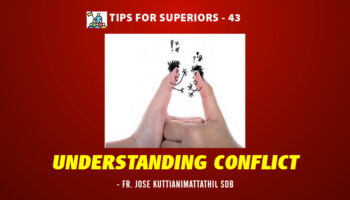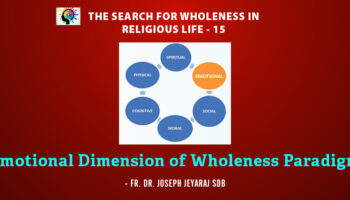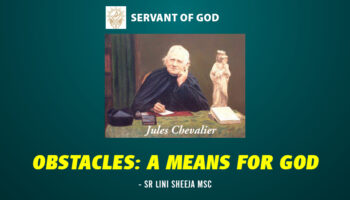Fr. Martin was a counsellor at a well-known Counselling Centre. He had a number of clients who were very appreciative of his counselling skills and the way he was helping them with their problems.
One of these clients was Anita, who had lost her husband a few months after their marriage. Anita had come to Martin to deal with her grief and loss. She found in Martin a very sensitive and compassionate helper. Anita appreciated not only his counselling skills, but also him as a sensitive human being.
After a few once-a-week sessions, Anita requested to increase the frequency of the sessions to twice-a-week. Meanwhile Martin had developed fond feelings for Anita. And he was happy with the increased frequency. He began to think often of Anita outside the sessions and looked forward to sessions with her.
During sessions Anita began to ask Martin for personal information. She said she would like to know him better. “I tell you so many things about myself, but I know so little about you,” she said. Martin was happy to comply. He began not only counselling her, but also to share his own difficulties with her. She sympathized with him. Martin found Anita’s expression of care and concern for him quite gratifying.
During one session Anita asked Martin when his birthday was. He told her. In one of the following sessions she brought him an expensive gift and said it was for his birthday. He accepted it and thanked her.
At the end of that session, both lingered on at the door, talking about a number of things which had nothing to do with the issue that Anita had initially wanted to work on. As she left the room Martin patted her gently on the back. She smiled back at him in appreciation.
Two days later, Anita phoned Martin and asked if he could join her for coffee at a Shopping Centre. “To celebrate your birthday,” she said. Martin initially said better not, but then Anita managed to persuade him and he agreed.
During coffee both expressed appreciation and fondness for each other. “We should do this more often,” Anita said. As they left, they hugged. Next day Anita phoned Martin to say how much she had enjoyed their time together at the Coffee Shop. Martin said he too enjoyed it.
At the next session, Anita said she wanted to terminate counselling. She was feeling better, she said, but would like to keep in touch with him. Martin also thought it better to end the counselling relationship and just have a social one, even though he knew that Anita’s grief and loss issues had not been resolved sufficiently….
Some months later Martin resigned from the Counselling Centre and asked permission from his superiors to leave his Congregation.
This Anita-Martin story points to some ethical challenges in Counselling. Like any profession, Counselling has its ethical principles and codes. Ethics in Counselling refers to the attitudes, dispositions and behaviours appropriate to the practice of counselling.
Ethical Boundaries
When we talk about ethics in Counselling, the concept of boundaries is very important. An ethical boundary is the “edge” of appropriate behaviour expected of the counsellor. Boundaries are set in place to foster a sense of safety for the client and to prevent the counsellor from harming or exploiting clients who are in a very vulnerable position in relation to the counsellor. Boundaries determine what is excluded or included in the counselling process and relationship. In this sense, boundaries can be considered as guidelines that formulate what is acceptable or unacceptable in counselling practice. Each Counselling Association has its Code of Ethics which articulates what these boundaries are. Thus, the Conference of Catholic Psychologists of India and the Salesian Psychological Association of South Asia have articulated their own Code of Ethics.
Since this issue of MAGNET has Counselling as cover story, I shall focus on boundary crossings and violations in this issue and describe in the next some of the principles that govern ethical practice of Counselling.
Boundary Crossing
There are to two types of boundary transgressions in Counselling. These are boundary crossings and boundary violations. Boundary crossing refers to any deviations from the strictest professional role and which by themselves do not harm the client or the counselling relationship, and which may even advance the Counselling in constructive ways.
Some common boundary crossings in counselling are counsellor’s self-disclosure related to client’s issues, non-sexual touch, the exchange of small gifts or greeting cards on special occasions or at termination of counselling.
What is important in deciding whether to cross a boundary is that the counsellor is sure he or she is acting in the best interests of the client, and not seeking to gratify his or her own needs at the expense of the client.
The boundary crossings that Martin was engaged in (revealing personal information, accepting gifts, meeting outside the counselling office, phone calls etc…) were not really at the service of the counselling process, but gratification of his and Anita’s emotional neediness. These were harmful crossings.
Boundary Violation
A second kind of boundary transgression in counselling is the boundary violation. A boundary violation is a clearly “harmful crossing” of a boundary. It occurs when a counsellor crosses the line of decency or integrity or misuses his or her power to exploit or harm the client. Whenever any of the traditional counselling parameters, such as time and place for therapy, confidentiality, dual relationships, gifts and self-disclosure (these will be discussed in the next issue), are transgressed to gratify the counsellor’s own needs without in any way enhancing the counselling process, there is clear violation of boundaries.
Engaging in sexual intimacies, even when consensual, within the counselling encounter is always a clearly unethical boundary violation. It is a decidedly harmful violation of boundaries. It is an abuse of trust and a violation of the counsellor’s professional role. It completely alters the nature of the counselling relationship, turning it into something it was never meant to be. Most ethical violations complaints against counsellors happen in the area of sexual boundary violations.
Terminating a counselling relationship with the intention of pursuing a romantic or sexual relationship, or suggesting explicitly or by innuendo while in counselling the possibility of such post-termination relationship is considered unethical.
The Slippery Slope
The concept “slippery slope” is especially relevant in sexual boundary violations. This phrase refers to seemingly harmless boundary crossings gradually escalating – slipping and tumbling down – into serious boundary violations. An example is that of the counsellor becoming more social, as happened with Martin and Anita. The self-disclosures about personal problems, small talk after the sessions ended, the lingering at the door, the pat on the back, the phone calls, and so on, were leading Martin to be on the slippery slope.
Violation of ethical boundaries can do great harm to the client and undermine effectiveness of counselling. An ethically conscious counsellor is careful to avoid the “slippery slope” – situations that develop gradually and undermine what once were firm boundaries. Before long, the situation can spiral out of control, leading to boundary violations that harm the client and gravely rupture the counselling relationship, impair counselling outcome, and sometimes lead to legal troubles for the counsellor and compromise his or her future practice.
In the next issues we shall look at a few more boundary issues and some important ethical principles that should guide the counselling practice.
Questions For Reflection
1. In case you have been a counsellor or a counselling client, what have been your experiences around boundary crossings and boundary violations?
2. In case you experienced these, what was the impact on you and the counselling process?
– Rev. Dr. Jose Parappully, SDB, is the Founder-Director of Sumedha Centre, which runs courses and retreats in psycho-spiritual integration. He also does individual and group therapy.
To subscribe to the magazine Contact Us





